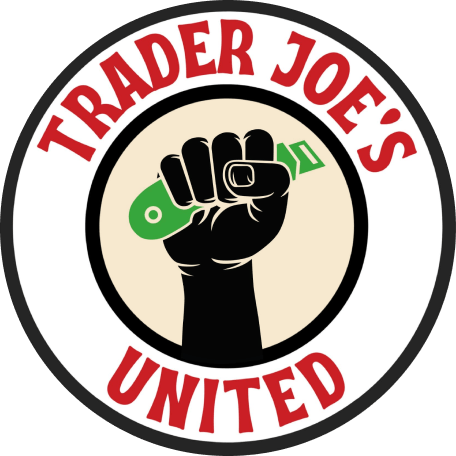FAQs
-
Nothing about the terms or conditions of your employment will change until a union contract is ratified (voted on by union membership). After your store unionizes, Trader Joe’s can no longer make changes to your compensation or working conditions without consulting workers as a union. This is a major protection at a company that’s been steadily chipping away at our benefits for the last decade.
Your pay, benefits, and working conditions will remain the same–you can expect the same review and raise cycle, the same 401k contribution, the same AR and health care plans–until a union contract goes into effect. Should Trader Joe’s offer something awesome to non-union stores, your store will get it too—Trader Joe’s is simply obligated to bring it to our union first.
After a union yes vote, you’ll also have Weingarten Rights. This means that you have the right for a union representative to sit in and advocate for you at any investigatory meeting with management that could potentially lead to discipline.
-
There are a lot of great things about working at Trader Joe’s. A union can protect those things, improve our workplace, and keep Trader Joe’s in line with its core values. We believe that every worker, in every workplace and industry, can benefit from having a union because a union is real power and a real voice at work.
While Trader Joe’s maintains that their “open door policy” is all crew members need, corporate is not truly listening to the crew. A union gives us actual power to make change within the company. As a union, we can sit down at the negotiating table with our employer as legal equals to create a contract that meets the needs of the crew. Nothing else can do that.
-
Trader Joe’s United is unaffiliated with any established union. While we are independent, we are not alone. Solidarity is a real thing, and TJU has received help in many forms from different organizations and people across the labor movement.
We chose independence because we wanted to create a truly worker-driven union from the bottom up. This has granted us incredible autonomy in our decision making processes, ensured that Trader Joe’s workers are the only priority of our union, and will help us preserve what we love about our workplace in the contract we ultimately win.
-
We actually don’t make “demands” at the bargaining table, though this is a common misconception. Negotiation is a process of back and forth, and both parties must approach the process in good faith.
That said, you can read about the process and our initial proposals on our bargaining updates page. Big picture, we are seeking a contract that will improve our lives and working conditions by addressing wages, health care, retirement, safety, paid time off, and a number of other issues that are important to the crew.
-
Crew at all union stores are welcome to participate in proposal brainstorm meetings where we seek to get consensus on proposals. Those initial ideas are then refined by the bargaining committee, which consists of volunteers from all union stores, before our legal team helps draft the actual proposals that we will bring to the table. It’s as democratic of a process as possible, and we encourage all crew to participate.
Crew members are active participants in not only the proposal development process, but also the bargaining sessions themselves. Crew at all union stores are present at the table, along with our legal team.
-
Despite the company’s reputation as a “progressive” employer, we’ve been disappointed to find that Trader Joe’s response to our union efforts is similar to that of companies like Amazon and Starbucks. We have encountered a great deal of pushback and classic union busting tactics from Trader Joe’s corporate, but that hasn’t slowed us down. We’ve filed numerous unfair labor practice charges with the National Labor Relations Board, and are awaiting our first rulings.
-
Dues are used to help enforce our contract, organize other stores, cover legal costs, build a strike fund, conduct trainings, reimburse stewards and bargaining committee members for time spent conducting union business, and more.
Dues will not go into effect until after our contract is ratified (approved by union membership). The exact amount of dues will be decided as we develop our contract, but typical union dues are 1-2% of a worker’s gross earnings. In most cases, the improved wages and benefits associated with a contract far outweigh the cost of dues. And we trust that Trader Joe’s crew members will only vote to ratify a strong contract.
-
Also known as a collective bargaining agreement, a union contract is a document negotiated between workers and their employer. The contract sets forth the pay, benefits, policies and working conditions of a workplace. Before a union contract goes into effect it must be ratified (voted on) by the workers it covers.
-
Strikes are rare, and only happen if a majority of workers vote “yes” to strike.
During the campaigns leading up to the vote at our unionized stores, we heard a lot of misinformation and fear mongering from management, about strikes in particular. Why? Because strikes are powerful. They are one of the most effective tools we have–which makes them something to embrace, not fear.
-
We can help! Fill out this form, and you’ll get an email with next steps, and be put in touch with our Organizing Director, Tony Falco, who also happens to work at the Hadley, MA store. (In the meantime, be discreet, and avoid discussing the “U” word at work.)
-
You heard right! In January 2024, Trader Joe’s argued that the NLRB is unconstitutional as an affirmative defense in an NLRB hearing where the company is accused of multiple unfair labor practices. Learn more and take action by visiting our Protect the NLRB Action Hub.
